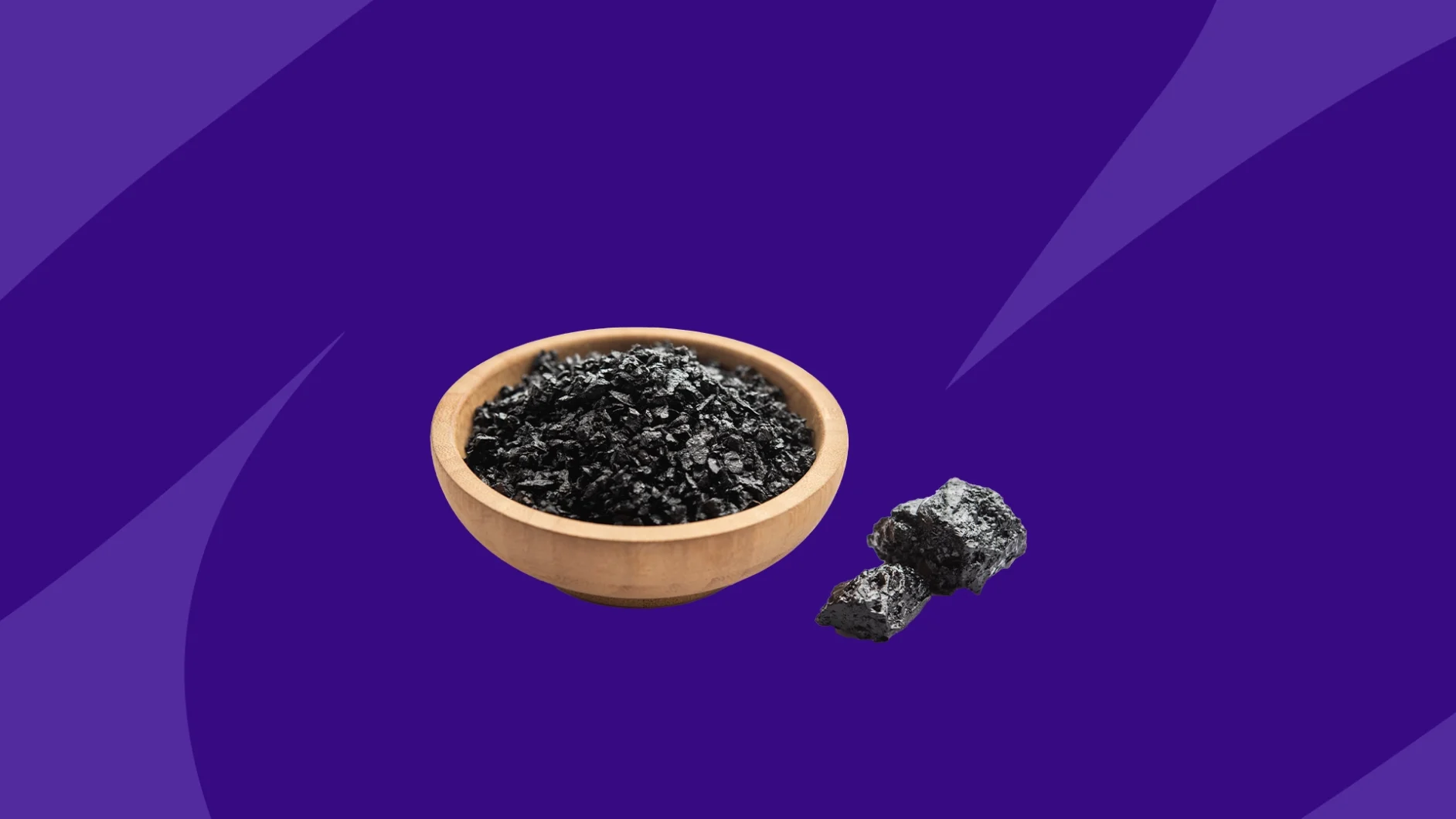Shilajit, also called mumie or mineral pitch, is a mineral-rich, sticky substance typically found in the rocks of the Himalayan mountains formed by centuries of decomposition of plants. It is gaining popularity as a dietary supplement, due to its potential health benefits, such as increasing energy levels, reducing inflammation, and improving iron deficiency anemia.
“Shilajit is traditionally taken as a resin in small amounts but can also be consumed as a dried powder, capsules, or as a liquid extract,” says Katie Silcox, founder of Shakti School, an ayurvedic medicine school for women.
But just because something is popular doesn’t mean it’s good for you. Here we look at the medical research behind shilajit and explore the health and wellness benefits.
10 health benefits of shilajit
Shilajit contains an abundance of fulvic acid, humic acid, minerals, proteins, and dibenzo-α-pyrones—an important group of metabolites that have antioxidant, antiallergic, and antimicrobial properties. Here are the 10 ways these could improve your health.
1. Reduce inflammation
Similar to ashwagandha, shilajit is thought to reduce inflammation in the body. Shilajit resin contains fulvic acid, which may play a role in preventing or reducing inflammation.
Inflammation is a natural response by the body’s immune system to protect itself from harmful bacteria or during an injury. However, chronic inflammation can contribute to many medical conditions, including arthritis, diabetes, atherosclerosis, and neurological diseases. Since shilajit has anti-inflammatory properties, it may help reduce the risk of these and other inflammatory conditions.
2. Reduce aging
“Fulvic acid, found in shilajit, may be effective in preventing cellular damage and damage caused by free radicals—the main culprits for the acceleration of aging symptoms,” says Praveen Guntipalli, MD, a double-board-certified physician in internal medicine and obesity and the medical director of Sanjiva Medical Spa in Dallas.
Additionally, a recent randomized, double-blind study indicated that dietary supplementation with shilajit extract may have collagen-promoting effects and may help reduce age-related bone loss.
3. Improve bone health
Researchers in the above-mentioned randomized study found a significant increase in bone mineral density in a group of postmenopausal women receiving shilajit supplementation compared to a group receiving a placebo. The study indicates that by decreasing bone turnover, shilajit may reduce bone loss and the risk of bone fractures and osteoporosis—particularly in high-risk populations. Bone turnover is the rate at which bone cells called osteoclasts break down bone tissues to rebuild the bones. An accelerated bone turnover increases the risk of osteoporosis.
4. Improve symptoms of Alzheimer’s disease
Alzheimer’s is a progressive neurodegenerative disease characterized by a decline in memory, learning, thinking, and organizational skills. According to some research, shilajit may help prevent or slow down the progression of Alzheimer’s because fulvic acid, which has antioxidant properties, prevents inflammation and the build-up of tau protein in the nervous system. Too much tau protein can trigger brain inflammation and brain tissue damage.
Another 2012 article suggests that a formula containing shilajit and vitamin B complex may be effective against Alzheimer’s disease. While these studies show promising results, it is crucial for researchers to carry out more research to fully establish its role in cognitive health.
5. Relieve symptoms of altitude sickness
Traveling from a low to a high altitude can cause symptoms including lethargy or tiredness, insomnia, vomiting, dementia, and body pain. Traditional medicine practitioners believe that shilajit eases these symptoms because of its high fulvic acid and mineral content, which helps stimulate the immune system and promotes energy production in the body.
6. Treat chronic fatigue syndrome (CFS)
Shilajit means “conqueror of mountains and destroyer of weakness” in Sanskrit, which comes from traditional Indian practitioners’ belief that the supplement can eliminate weakness or fatigue with its rejuvenating effect. In a 2012 animal study, researchers induced chronic fatigue syndrome (CFS) in rats for 21 days. They found that shilajit helped reduce the symptoms of CFS by preventing problems in the mitochondria, also known as the powerhouse units inside cells. Although promising, more research is needed to confirm if these benefits extend to humans.
7. Support men’s health
Shilajit is believed to improve reproductive health and fertility in men by increasing total sperm count, sperm motility, and testosterone levels. A 2010 study found almost 50% of a group of 60 infertile males had an increase in sperm count after taking shilajit twice a day for 90 days. In another clinical study that enrolled 96 males between the ages of 45 and 55, researchers found an increase in total testosterone levels in the group receiving shilajit supplements for 90 days compared to the group receiving placebo.
8. Treat iron-deficiency anemia
A lack of healthy red blood cells or hemoglobin in the blood can lead to anemia. Iron deficiency can also cause a type of anemia called iron deficiency anemia, which causes symptoms like headache, weakness, and fatigue. Since iron is a mineral in shilajit, it may help treat iron deficiency anemia, as indicated by an older study carried out on rat models. As a result, it may also help relieve symptoms like fatigue associated with the condition.
9. Reduce the risk of heart disease
Shilajit may also be good for heart health. After administering shilajit to a group of lab rats prior to inducing injury to their heart muscle, researchers in a study published in Cardiovascular Toxicology found that the group that received the shilajit treatment had less heart damage compared to the group that did not receive it.
In another small 2003 study where researchers placed participants into two groups—a placebo group and a shilajit receiving group—the researchers found a decrease in cholesterol and triglyceride levels in the shilajit group. Excess cholesterol and triglycerides in the blood can harden the arteries and cause plaques, increasing the risk of developing high blood pressure and heart disease.
10. May help boost muscle repair
According to a study that assessed how skeletal muscle messenger RNA responds to shilajit, people with obesity who took the supplement responded better to exercise than those who didn’t. Shilajit may help activate genes that enable the skeletal muscles to adapt quickly to new workouts. In other words, shilajit may help improve muscle repair, especially in certain people.
Shilajit side effects
As with any supplement, it is possible to experience side effects when taking shilajit. They include:
- Headache
- Dizziness
- Nausea
- Upset stomach
- Diarrhea
- Low blood pressure
- Hives, rash, or trouble breathing due to allergic reaction
“The side effects of well-sourced and appropriately administered shilajit are rare, but in cases of intolerance or allergy, discontinue use and consult your ayurvedic practitioner,” says Kirsten Ahern, a clinical ayurvedic specialist and founder of Path Wellbeing. If you experience a severe allergic reaction (such as trouble breathing), seek immediate medical care.
Taking shilajit without an expert’s supervision is risky, considering there is no concrete scientific evidence to determine a standard dose for this supplement. Meaning, you could accidentally take too much. One of the possible results of this is an iron overload. Since shilajit contains iron, taking too much within a short time may cause excess iron to accumulate in different body organs, including the heart, liver, and spleen, potentially damaging these organs in some people.
Is shilajit safe for everyone?
According to Silcox, shilajit is known as a sacred herb in ayurveda—but that doesn’t mean it is safe for everyone. If you take any medications, be sure to check with your prescribing healthcare provider to avoid potential drug interactions. People on hypertensive medications, specifically, may want to avoid shilajit as the combination may cause a drastic drop in blood pressure. Other people who should not use shilajit include:
- Pregnant people
- Nursing mothers
- Children
People with the following conditions should not take shilajit without consulting a healthcare provider first:
- People who are on medications like diuretics, antidiabetic medications, and immunomodulators
- People with hemochromatosis
- People with active heart disease
Regardless of who is taking the medication, it is important to purchase shilajit powder or resin from a reputable company and verify its purity. Supplements are not regulated by the Food and Drug Administration (FDA), so contamination is possible. It’s important to work with an educated provider or practitioner who can recommend the best brands to buy.
Bottom line: Should you take shilajit?
Shilajit is a powerful supplement traditionally used to build strength and boost fertility. Ayurvedic practitioners see it as a master herb for boosting energy, mood, memory, brain health, blood sugar balance, and the overall detoxification and oxygenation of the body.
But “nobody should ever take shilajit without consulting with their ayurvedic clinician or other qualified holistic healthcare practitioners,” Ahern says. Healthcare practitioners will advise the best use of shilajit —whether to take it every day and in what form a person should take it.
Sources
- Traditional medicine in India, Journal of Traditional Chinese Medical Sciences (2021)
- The effects of Shilajit supplementation on fatigue-induced decreases in muscular strength and serum hydroxyproline levels, Journal of the International Society of Sports Nutrition (2019)
- Natural dibenzo-α-pyrones and their bioactivities, Molecules, (2014)
- Ayurveda: controversies and the need for integration with mainstream medicine, The Journal of Global Health (2017)
- Shilajit: A natural phytocomplex with potential procognitive activity, International Journal of Alzheimer’s Disease (2012)
- Can nutraceuticals prevent Alzheimer’s disease? Potential therapeutic role of a formulation containing shilajit and complex B vitamins, Archives of Medical Research (2012)
- Shilajit extract reduces oxidative stress, inflammation, and bone loss to dose-dependently preserve bone mineral density in postmenopausal women with osteopenia: A randomized, double-blind, placebo-controlled trial, Phytomedicine (2022)
- Shilajit extract reduces oxidative stress, inflammation, and bone loss to dose-dependently preserve bone mineral density in postmenopausal women with osteopenia: A randomized, double-blind, placebo-controlled trial, Phytomedicine: International Journal of Phytotherapy and Phytopharmacology (2022)
- Shilajit attenuates behavioral symptoms of chronic fatigue syndrome by modulating the hypothalamic–pituitary–adrenal axis and mitochondrial bioenergetics in rats, Journal of Ethnopharmacology (2012)
- Clinical evaluation of purified Shilajit on testosterone levels in healthy volunteers, Andrologia (2015)
- Clinical evaluation of spermatogenic activity of processed Shilajit in oligospermia, Andrologia (2010)
- Cardioprotective effect of mumie (shilajit) on experimentally induced myocardial injury, Cardiovascular Toxicology (2014)
- Shilajit: evalution of its effects on blood chemistry of normal human subjects, Ancient Science of Life (2003)
- The human skeletal muscle transcriptome in response to oral Shilajit supplementation, Journal of Medicinal Food (2016)
- Evaluation of safety profile of black shilajit after 91 days repeated administration in rats, Asian Pacific Journal of Tropical Biomedicine (2012)
- Shilajit in management of iron deficiency anemia, Journal of Pharmaceutical and Biomedical Sciences (2010)











